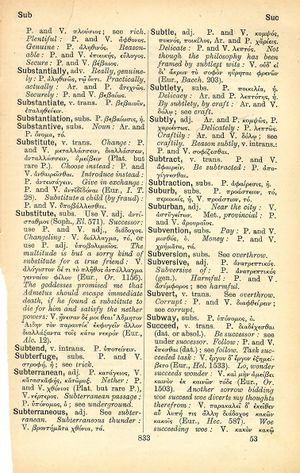succeed
ὃν οὐ τύπτει λόγος οὐδὲ ῥάβδος → if words don't get through, neither a beating will | if the carrot doesn't work, the stick will not work either | whom words do not strike, neither does the rod
English > Greek (Woodhouse)
v. trans.
P. διαδέχεσθαι (dat. or absol.).
Be successor: see under successor.
Follow: P. and V. ἕπεσθαι (dat.); see follow.
Task succeeded task: V. ἔργου δʼ ἔργον ἐξημείβετο (Eur., Hel. 1533).
Lo, wonder succeeds wonder: V. καὶ μὴν ἀμείβει καινὸν ἐκ καινῶν τόδε (Eur., Or. 1503).
Another sorrow bidding woe succeed woe diverts my thoughts therefrom: V. παρακαλεῖ δʼ ἐκεῖθεν αὖ λυπή τις ἄλλη διάδοχος κακῶν κακοῖς (Eur., Hec. 587).
Woe succeeding woe: V. κακὸν κακῷ διάδοχον (Eur., And. 802).
V. intrans. Be successful, of persons or things: P. and V. ὀρθοῦσθαι, εὐτυχεῖν, κατορθοῦν (or pass.), εὖ φέρεσθαι; see answer.
Of persons only: P. and V. τυγχάνειν, P. κατατυγχάνειν, ἐπιτυγχάνειν.
When he didn't succeed: P. ὡς αὐτῷ οὐ προὐχώρει (Thuc. 1, 109).
Of things only: P. and V. εὖ χωρεῖν, προχωρεῖν.
Succeed in: P. and V. δύνασθαι (infin.), ἔχειν (infin.); see be able, under able.
Come next: Ar. and P. ἐπιγίγνεσθαι.
Succeeding: P. and V. ἐπιών; see under succeeding.
Succeed to, inherit: P. and V. παραλαμβάνειν (acc.).

